#Allen Klein
Text
A BEATLE DIDN’T SAY THAT! Lewisohn’s lab-created quotes
“One of the things about this book that is a strength is it’s not me saying anything, it’s them or other people. I shape the text, I plot where it goes, I weave it, but the quotes are theirs. And so when I’ve got Paul McCartney behaving in a way some readers might think, ‘Whatever, oh dear,’ it’s actually him saying it. So you end up thinking that to his own credit he said that. It’s not me saying it.” (Mark Lewisohn, ‘Noted,’ (October 7, 2013) Somerset, Guy.)
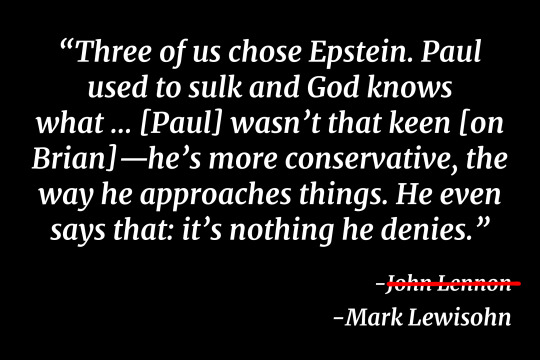
This is hella long, and that's because it's actually a full blog post. (In case you want it in a less monstrous form.)
A lot of people for a long time have put a lot of trust in Mark Lewisohn’s footnotes. Or at least in the fact of those footnotes. Because once you dig through them for any length of time you quickly discover that Mark Lewisohn’s footnotes hold secrets that would get him expelled from any undergraduate program. They reveal a “history” often contrived through a mass of Frankenquotes, ala carte creations, Lewisohn rephrased ‘paraphrases,’ and worse. For some parts of the narrative things aren’t too bad, yet in others monsters lurk around every corner. But this is not the sort of thing that’s graded on a curve, and it is past time to have a conversation about what standards should be accepted in Beatles’ scholarship.
Lewisohn lists his sources unlike most others. And his footnotes alone are more insightful than some other writers’ books. (Reddit, r/beatles)
I do not judge footnotes based on their insightfulness, nor do I want to single out a redditor, but I grabbed the comment because it’s an opinion that is widely shared and even accepted as canon. At least by people who have not combed those freakish footnotes. And while the pages of piled up sources do look fearsome en masse, a closer inspection reveals an offense to the truth, a threat to the record, and a blight on Beatles’ historiography.
“The rules for writing history are obvious. Who does not perceive that its chief law is never to dare say anything false, and never dare withhold anything true? The slightest suspicion of hatred or favor must be avoided. That such should be the foundations is known to all; the materials with which the building will be raised consist of facts and words.” –Cicero
A Look at Lewisohn’s Lab-created Frankenquotes
FIRST, WHAT ARE QUOTES? AND WHY ARE QUOTES?
Quotes are the soul and center of recorded—and recording— history.
And the rules around quotes and quotation marks are pretty simple. Most people, even if they’ve never written anything beyond a term paper, understand what quotation marks represent.
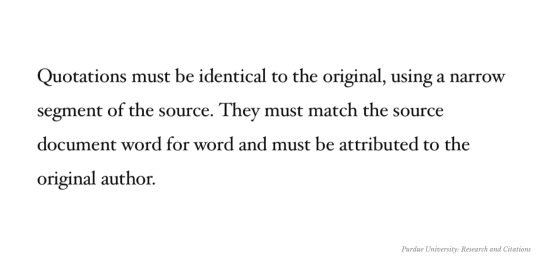
A set of quotation marks means, “This person said or wrote ‘these exact words’ at some given time.” You can smash a quote from two hours before or two years before right up against a separate quote to make your point—although it might get your grade lowered—but what you cannot do is take two different statements from two different times and make them seem like they are one statement.
When you put words inside one set of quotation marks you are stating, in black and white, that the identified person made this statement. That they said all those words together—or if you want to excise a reasonable part and use ellipses to represent that— as part of the same statement.
Look, combining two separate quotes that are not part of the same thought or topic is not a subjective issue. It is not an issue of controversy. Quotes are the bone marrow of written history. Quotes are the alpha and omega. In academic work or journalism they have to be, which makes sense as soon as you think about it. If it was cool for me to take a transcript and grab half a sentence from page 2 and half a sentence from page 17, push them together as if those words were spoken one after the other in a single thought, I bet I can manage to get those words to say almost anything I want.
Separate thoughts must be in two separate quotation marks. Separate. Somewhere between four sentences and a paragraph is widely accepted as the “two separate quotes” line, and there can be some ethical and technical wiggle room in a long rant by a person, but what makes all that subjective nonsense go out the window is if the quotes come from two separate questions. Or two separate days. That’s two quotes. Not hard.

Which again, makes sense if the point is conveying information to the reader and lessening the chance of a writer manipulating someone else’s words to express something that the person didn’t mean.
This is the contract inherent in a quote. These are the rules we all agree to and understand, and these are the reasons why. And there’s no reason to break them.
Why do you want me to believe that John said these two things at one time? What was wrong with what he did say?
THE FOUR MOST COMMON WAYS MARK LEWISOHN MAULS THE MEANING OF THE QUOTE:
The Basic Lewisohn Frankenquote 🧟♂️
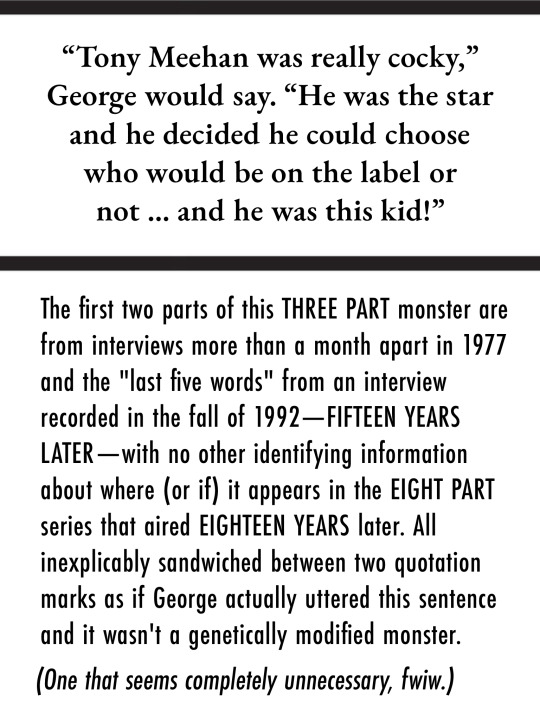
(“CONCLUDING FIVE WORDS FROM—” – I cannot even see the point of this THREE PART monster. Full footnote reads: 9) Author interview with Tony Meehan, September 6, 1995. (“I met George again in 1968 and for some reason he was harboring a grudge against me. He was very, very uptight about it—’You blocked us getting a recording contract …’ ”) First part of George quote from interview by Terry David Mulligan, The Great Canadian Gold Rush, CBC radio, May 30 and June 6, 1977; concluding five words from interview for The Beatles Anthology)
This three-headed monster attributed to George Harrison is a very dull little guy. Not particularly venomous. Just convenient, I guess. For whatever reason, Mark Lewisohn decided it was worth rummaging through the quote buffet until he collected enough pieces for George Harrison to say this thing. “…concluding five words from…” What are we even doing here? No, really. Please tell me.
And like a lot of the footnotes for these bespoke quotations, there are further problems. “[F]rom interview for Beatles Anthology”? An interview that aired? In one of the episodes? Can you narrow it down? I guess I’ll just have to listen very closely to them all and hope I don’t miss the five words.
But if we got bogged down in the sorts of trivial details that would immediately lose a college student a letter grade off a History 101 paper we would never get anywhere. We have to stick to the violent felonies.
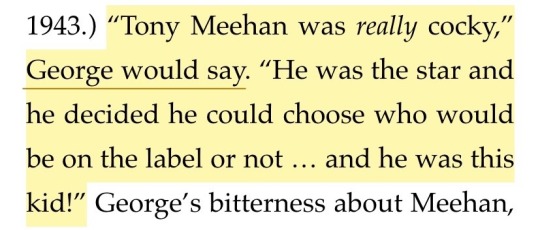
*Love the "George would say——" Uh, would he? Well, I guess after all that trouble you went to, he would now. It's really incredible how cavalier Lewisohn is about a Beatle's words.
These sorts of reconstituted, lab-engineered, made up “quotes” are shot throughout Tune In. “Quotes” made up of words from two, three, and even four sources, spoken months or often years apart.
Ala Carte Creations 🍱
It really is a buffet, and these ala carte creations come in all shapes and sizes. They might just be words that have been plucked up and glued back together to make something more useful to a particular narrative. (Ellipses or dash optional.)
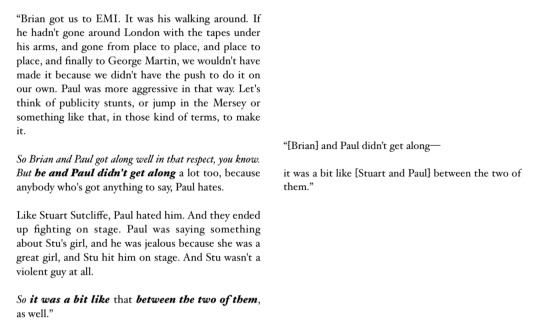
TUNE IN: “John saw a bigger picture, and it would be surprising if it wasn’t equally obvious, or made obvious, to Brian and George. He likened Paul’s enduring snag with Brian to his other long-standing difficulty: ‘[Brian] and Paul didn’t get along—it was a bit like [Stuart and Paul] between the two of them.’” (Footnote 37: Interview by Peter McCabe and Robert D. Schonfeld, September 1971)
Bonus 🍒 Phoebe's dramatic reading of John's original quote:
The Donut 🍩
Then there are a seemingly uncountable number of “quotes” with a sentence or three ripped out from the middle, but with zero representation that more words were ever there. (And in most of these particular deceptions, the simple representation of something excised (. . .) would make the quote fine. There are a lot of these, but they are also the easiest to fix.)

Chapter 10: “I was in a sort of blind rage for two years. [I was e]ither drunk or fighting. **It had been the same with other girlfriends I’d had.** There was something the matter with me.”
And then there are the true buffet bonanzas, words lifted and twisted beyond recognition until they say something brand spanking new.
However, John remembered Paul’s attitude to Brian being very different. John was always emphatic that Paul didn’t want Brian as the Beatles’ manager and presented obstacles to destabilize him, to make his job difficult … like turning up late for meetings. “Three of us chose Epstein. Paul used to sulk and God knows what … [Paul] wasn’t that keen [on Brian]—he’s more conservative, the way he approaches things. He even says that: it’s nothing he denies.”
The Lewisohn Remixes 🍸
And then there are the “paraphrases.” I couldn’t even begin to guess how many of these there are, and often they aren’t even paraphrases, but whole new Mark Lewisohn re-interpretations with quotation marks slapped around them. But if you don’t check, you probably won’t know, because like this Lewisohn rewrite of a well-known Mrs. Harrison quote, there’s a good chance you’ll recognize the bulk of it, making it less likely that you’ll catch the scalpel work excising Paul. And while I don’t want to get caught in the nooks and crannies of intent in an example like this one I have to say, just this once, that what has to be a purposeful excising of Paul to create a slightly new quote on one side, combined with a badly acted, bad faith—(or bad scholar)—“Where was Paul when John’s mom died?” on the other, is par for the course.
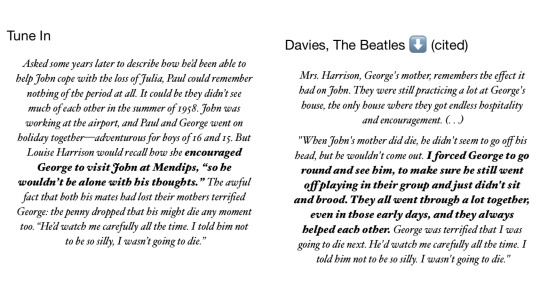
George Harrison’s mom’s made up Lewisohn rephrase which coincidentally removes Paul from the imagery.] ❦ LEWISOHN:“ Asked some years later to describe how he’d been able to help John cope with the loss of Julia, Paul could remember nothing of the period at all. It could be they didn’t see much of each other in the summer of 1958. John was working at the airport, and Paul and George went on holiday together—adventurous for boys of 16 and 15. But Louise Harrison would recall how she encouraged George to visit John at Mendips, “so he wouldn’t be alone with his thoughts.” ❦ DAVIES: “They were still practicing a lot at George’s house, the only house where they got endless hospitality and encouragement. . . . I forced George to go round and see him, to make sure he still went off playing in their group and just didn’t sit and brood. They all went through a lot together, even in those early days, and they always helped each other.”
Why do you have to slice and dice and reconstitute people’s words? No writer, and certainly no historian, should ever feel empowered to take words from a historical figure from two or three different places and topics and times, splice them together, and tell us, “Winston Churchill said this.” No he didn’t! Why are you so intent on changing the words of the people you’re writing about? What’s wrong with just using two different quotes?
You cannot take two or three quotes from two or three or even four separate statements, stick them between one set of quotation marks and say John or Paul or George or Joe Smith said this.
No they didn’t. They never said that. Why do you want me to think they did??
All these words are Abraham Lincoln’s, but this is not a Lincoln quote:
“Every man is said to have his peculiar ambition. Whether it be true or not, I can say for one that I have no other so great as that of — making a most discreditable exhibition of myself.”
(I kept it ridiculous, although I didn’t have to.)
But I want you, the reader, to be saying to yourself, “Okay, enough already. I get it!” Because in the last few days I have wandered too far into the weeds too many times and written far too many words detailing the multiplicity of ways Mr. Lewisohn does violence to each and every law of reporting historical facts, and could write many more. And I will post a more detailed list of the crimes against the quote that I am charging Mark Lewisohn with as we go forward, but I don’t think we need that now. The fact is that every fair-minded person knows what quotation marks represent, and there is no more fair-minded group of people than serious Beatles fans and scholars. And it is those fair-minded scholars who I want most to hear me. Whether you’ve written books or host a podcast or just know that you know a whole lot of stuff and take seriously your part of the trust in preserving the truth about The Beatles for us and future generations, it is you I am really talking to. My Cicero quoting-freaks. The ones who care about getting it right.
“The chief, the only, aim of style is to put facts in a clear light, with no concealment.”
- Lucian of Samosata
What footnotes can do, and what footnotes can’t.
You can list multiple sources in a single footnote. That’s not only fine, it’s correct. If I want to tell part of a story based on several sources, that often means several sources in a footnote. But not for one, single quote.
The problem isn’t the footnote, it’s the bioengineered quote on the page that you swept under a footnote hoping I wouldn’t notice.
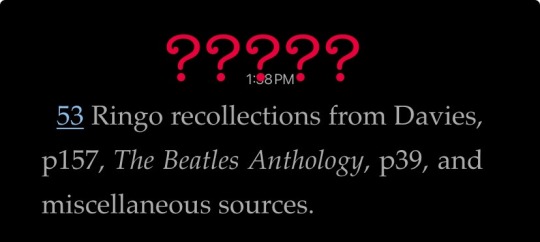
Which leads us to what a footnote is not. A footnote is not a post-hoc fixative for your textual sins. You cannot do whatever you want as long as you confess it in a footnote. A footnote is not a magic spell. A footnote is not the universally understood symbol for “I have my fingers crossed behind my back.” You cannot fix lies and misrepresentations in the footnotes. Footnotes aren’t for trying to chase down three different sources to match up which part of a manufactured “quote” someone said on which date. Footnotes are not the picture on the front of a puzzle box. I should not need to find corner pieces to figure out which of these George Harrison words were actually spoken together.
Footnotes are a truthful and independently verifiable record of primary sources. It’s that simple.
And taking Mark Lewisohn completely out of the picture for a moment, I feel sure we can all agree that neither John Lennon nor Paul McCartney nor George Harrison nor Ritchie Starkey would want anyone rearranging their words as if they were guitar chords. You wouldn’t take three-quarters of Penny Lane and one-quarter of Across the Universe, put them together and call it a Beatles‘ song. So don’t take three quarters of John to Jann Wenner and one-quarter of John to Lisa Robinson, put them together and call it a Beatle’s quote.
MY PERSONAL STANDARD IS THAT IF SOMEONE REPRESENTS, “A BEATLE SAID THIS,” IT BETTER DAMN WELL BE SOMETHING A BEATLE SAID.
None of the Beatles, dead or alive, would be cool with their words being taken out of context at all, let alone two or three different statements on god knows what being combined into one. This isn’t hard, though. Use two or three separate quotation marks, and don’t take statements out of context. Don’t mix and match their words, but don’t twist them, either. If a person said something, it is the historian’s duty to represent those words to the best of your ability, and then use them to tell a factual story focused on what you feel is important. Staying true to the original words and true to their meaning. If you can’t use those words without twisting them, then change your story to fit their words, not the other way around. If their statement helps tell the story your way, use it! For goodness sake, John Lennon said at least two opposing things about almost every topic on earth, so there should be enough to choose from without being deceptive. I actually want the truth. Don’t you?
Biography is story based around accurately represented, trustworthy and verifiable facts. And look, Beatles fans, whoever your favorite is: we are not going to get the truth about his history if we don’t learn to take these things seriously. Let’s have—if not high standards—at least the lowest generally accepted standards. In the mid-term we need a lot more Beatles scholars with a lot more points of view, and now—right now—we need experienced Beatles scholars to prioritize searching out and finding smart, interested people to mentor. And we simply must ensure that we aren’t allowing to solidify into stone “facts” that are not facts and statements no one ever made. I don’t think any honest Beatles fan—(which rounds up to all of them)—wants any question around that issue.
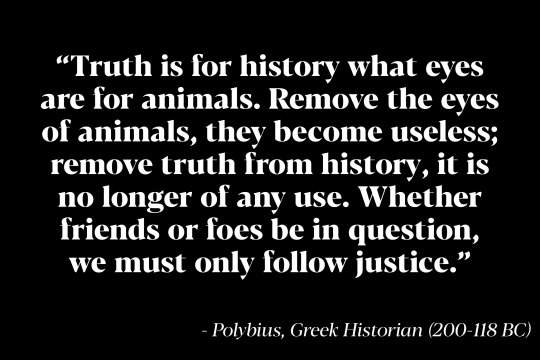
The record is the most important thing. Now, and always. This is not about John versus Paul. John versus Paul may live on always in our hearts, but for Beatles history, it’s the wrong question. I’d rather someone be up front about their loves, but in the end the focus should be on representing the primary facts in their most pristine form. Love who you love most, but place truth above all. Pristine facts. Pristine quotes. Nothing hidden. Nothing misrepresented.
Let the historical actors speak for themselves. That is their right.
And the historian’s duty.
NEXT, WE DISSECT A MONSTER.

Final note: I became frustrated and (maybe strangely) offended by Lewisohn's obscene pretenses in 2020, but my frustrations were nebulous and unfocused until this incredible AKOM series. I feel much better now. Angrier. But better. They worked their asses off. 🥂
#lewisohn#akom#the beatles#tune in#fine tuning#frankenquotes#lewisohn's monsters#historiography#paul mccartney#john lennon#george harrison#ringo starr#mark lewisohn#a beatle never said that#beatles#brian epstein#allen klein#Spotify
161 notes
·
View notes
Text
The following is an excerpt from the 1970 sworn affidavit of Paul McCartney, made in support of his Application to dissolve the Beatles. This passage pertains to the conflict that surrounded the release date of Paul’s first solo album. Some interesting insights here.

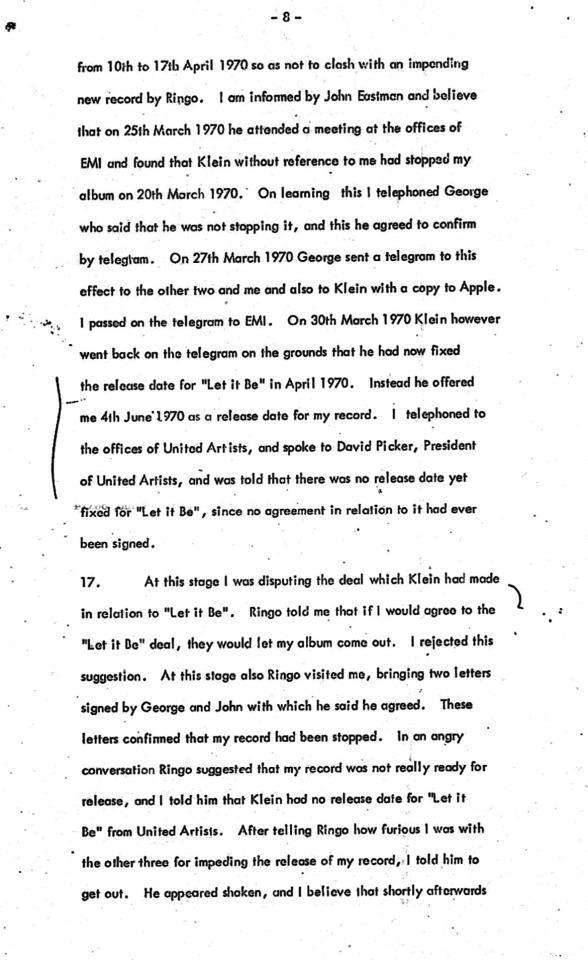

#(I can see why Paul got upset. Klein was definitely out there maneuvering.)#Paul McCartney#Allen Klein#(Had no idea that George originally sent out a telegram confirming that Paul’s album would not be held up/stopped.)#(Only for him and John to write a letter just days later confirming his album would be held up/stopped)#(Lol what?)#The Beatles
141 notes
·
View notes
Text


Paul goofing around, spotting Klein and immediately looking like someone stabbed him
#this is both funny and very upsetting to me#Allen Klein you’re my Judas#paul mccartney#the beatles#john lennon#george harrison#ringo starr#allen klein
249 notes
·
View notes
Text
A Monkberry Moon Delight lyrical analysis because it is the greatest song of the 20th century
Monkberry Moon Delight is a song from Paul McCartney's 1971 album Ram. The song is generally considered to be surrealist 'nonsense' lyrics a la Lennon's late Beatles work like 'I am the Walrus' and 'Glass Onion'. But if we know anything about Paul (and Lennon-McCartney in general), he tends to put deeper emotions into his songs, often with out meaning to and without his direct knowledge:
"I don't write anything consciously, Sometime when I'm pissed off with John over Apple business a line might creep in." - Interview with Disc And Music Echo (Nov. 20, 1971)
"Songwriting is like psychiatry; you sit down and dredge up something that's inside, bring it out front." - Interview with Robert Palmer for the New York Times (April 25, 1982)
" But in a song, that's where you can [share your innermost thoughts]. That's the place to put them. You can start to reveal truths and feelings." - Interview with John Wilson fork BBC 4's (May 24, 2016)
And my favorite because it's y'know...in a song: "And when I'm gone, I leave my message in my song" - Beware My Love (Wings at the Speed of Sound, 1976)
All that being said, in my opinion, Monkberry Moon Delight is a projection of Paul's feelings of anxiety about his post-Beatles public/critical reception and his reaction to John Lennon's antagonism post-divorce. Specifically, he details his writing of Too Many People as a response to John's antagonism and the making of Ram as an attempt to recapture public attention/praise.
For context: Monkberry Moon Delight was first written/demoed at some point from May-August 1970 on his farm in Scotland. Paul's late 1969-1970 Scotland era is complicated. He often describes it as being one of the most difficult periods of his life because of the break-up of the Bealtes, the Apple financial troubles, his frayed relationship with John, and starting a whole new life which all compounded into a deep depression and alcohol abuse.
Let's start with the title and chorus. In Paul's own words, Monkberry Moon Delight comes from his kids mispronunciation of the word 'milk' and establishes MMD as a fantastical drink like 'Love Potion No. 9'. I think Paul obviously hides behind the surrealism of the lyric but its association with family and domesticity makes an interesting contrast. Though he is happy to be in his escapist domestic fantasy in Scotland, he juxtaposes this with the underlying pressure to be acclaimed (especially after being considered the greatest artist in the world for ten years). Though the song has a peppy, jaunty beat there is an air of anxiety developed through the songs key of C minor and the staccato of the piano and bass parts. His vocals also have a similar strained desperation like 'Oh! Darling'.
The lyrics:
So I sat in the attic, a piano up my nose
And the wind played a dreadful cantata
Paul starts with himself, writing. 'The attic' may be a reference to John Lennon's recording studio that he had built in his attic in Weybridge where he and Paul would often go to write.
"We nearly always went up to his little music room that he'd built at the top of the house, Daddy's Room, where we would get away from it all. I like to get away from people to songwrite, I don't like to do it in front of people. It's like sex for me" - Many Years from Now. Whether or not this is a direct reference to 'Daddy's Room', Paul is known to prefer small, confined spaces for songwriting.
'Piano up my nose' to me shows a rapt attention, leaning so close to his piano its almost up his nose. He is intently and passionately composing his 'dreadful cantata', this cantata I believe refers to "To Many People". Based on this record of the order of demos on the Ram cassette, it seems that Too Many People may have been written (or at least recorded) before Monkberry, which furthers my belief that Paul is making a meta narration of the writing of his song which he recognizes was very pointed or dreadful.
Sore was I from a crack of an enemy's hose
And the horrible sound of tomato
Here he describes what spurred him to writing this song, and this album as a whole. The 'crack from an enemy's hose' could refer to Allen Klein's treatment of Paul during the final months of the Beatles and his attempted mishandling of the release of McCartney (1970). (Note: The crack could also be from Phil Spector, the press, Ringo, George, Yoko or John; Paul is kind of getting shit from all sides right now). The 'sound of tomato' implies the idea of throwing tomatoes at an artist to express dislike or dissatisfaction, referencing the poor critical reception of McCartney (1970).
Ketchup, soup and puree
Don't get left behind
Ketchup, soup, and puree; liquidy tomatoes because splat, splat, splat go the critics. And ketchup because catch up pun.
Don't get left behind is the central theme of this song. He is worried that the public is going to forget about him while he's depressed, away in Scotland, and making critical flops. This is him desperately clinging onto the hearts of the public. Because we all know how much Paul needs to be liked.
When a rattle of rats had awoken
The sinews, the nerves, and the veins
The 'rattle of rats' could be any of the number of people who were getting on his nerves, sinews, and veins (pissing him tf off) in 1970. This could again be referencing the great "Let's all gang up on Paul McCartney" game of 1970 but because of the subsequent lyrics, I think this may be more specifically about John (and Yoko). Either way, it was these rats who annoyed him into getting to work.
My piano was boldly outspoken
And attempts to repeat his refrain
'Boldly outspoken' again connects this song to TMP. The line is similar to the TMP lyric 'This is crazy and baby, it's not like me' in the sense that both show how audacious he sees this songs as. In 'attempting to repeat his refrain' I think Paul is using the 'well he started it' justification for TMP because he's sees it as a repeat, of him rising to John's level of insults.
So I stood with a knot in my stomach and I gazed at that terrible sight
Of two youngsters concealed in a barrel, sucking Monkberry Moon Delight
Ah yes my favorite moment in all of music ever. This is the verse that really convinced me that this song may be referencing JohnandYoko. The 'youngsters in a barrel' alludes to John and Yoko's bag piece, where they would get into a black bag for...peace? As seen in Get Back, this particularly irked/disturbed Paul. "Go get in your bag. The Merseybeat award for couple of the year, goes to John and Yoko" (Get Back Episode 2). He also refers to them as 'the young lovers' in Get Back during the infamous January 13th 'and then there were two' conversation. Even though it makes him nervous and sick, part of Paul releasing TMP and Ram is to face up to the JohnandYoko powerhouse which was a non-insignificant portion of his early 1970 criticism.
Well I know my banana is older than the rest
and my hair is a tangled baretta
Here I think he is reasoning to the listener, the public, over why he thinks they've abandoned him. Paul recognizes that he has been in this music game a long time (so people may have grown bored of him) and has been depressed (and thus out of the game), his tangled 'baretta' of hair like the wily depression beard he grew out while in Scotland.
Also banana = dick, just so everyone is clear (can anyone find that banana poem from his poetry book? Also this just perpetuates my tinhat theory that all the banana milkshakes Paul got in Paris were just **** **** but I digress). Also something about Paul likening songwriting with sex so him not being 'musically desirable' is because...his music dick is old? Ok Paul.
I leave my pajamas to Billy Budapest
And I don't get the gist of your letter
This is the one lyric I am pretty unsure about. Not that every line has to fit perfectly into my interpretation but I genuinely could not make heads or tails of it. My initial interpretation was that this was referring to Billy Shears, and how during this period the Paul is dead theory regained popularity. This reference adds to the feeling of dissolution he builds in this verse.
But mike on the Beatles Bible seems to remember Billy Budapest as being a children's pajama designer though I have found not evidence of this. However going with this shot in the dark, leaving his pajamas to Billy Budapest could draw back to the theme of his current domesticity and occupation with his children.
The letter in question I believe refers to the infamous letter John and George wrote to Paul changing his McCartney release date that they had Ringo deliver which really set Paul off and kind of began the messiness of the divorce.
Catch Up, cats and kittens
Don't get left behind
Finally we get the pay off to the ketchup-catch up pun and see the resurgence of the theme; Paul feeling like he's falling behind his contemporaries and desperation to catch up.
In typical McCartney fashion, Monkberry Moon Delight is a seemingly shallow and superfluous song but actually reveals a lot about his inner turmoil at the time. Him dealing with the rejection by the critics and John by turning to his piano and creating the absolute banger that is Monkberry. This is why MMD is one of Paul's best, because of how quintessentially Paul it is. Veiling tough emotions behind ambiguous and surreal lyrics masked by a fun and light melody. Oh, the juxtaposition! Oh, the Lennon-McCartney of it all.
Anyways this is a barely organized rambling of thoughts but Monkberry Moon Delight deserves a mega analysis because it is genuinely one of the best songs Paul McCartney has ever made.
#song analysis#monkberry moon delight#Ram (1971)#paul mccartney#linda mccartney#john lennon#yoko ono#allen klein#thank you for coming to my tedtalk#seriously can someone find that banana poem it's driving me crazy
101 notes
·
View notes
Text
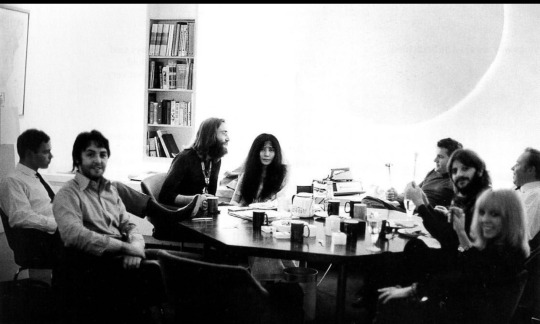
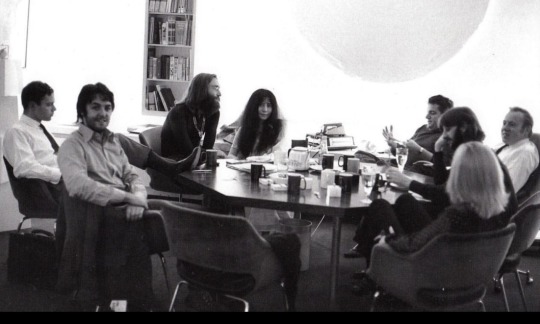
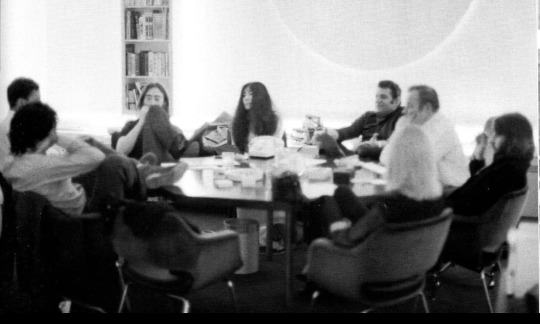

Photos: 1st, 2nd and 3rd taken by Linda McCartney - John Eastman (Linda's brother), Paul McCartney, John Lennon, Yoko Ono, Allen Klein, Ringo Starr, Maureen Starkey and Peter Howard during one of the Beatles' Apple meetings.
Last photo - Linda and Paul photographed by Maureen. 1969
#60s icons#girlsofthesixties#60s couples#linda mccartney#paul mccartney#ringo starr#maureen starkey#john lennon#yoko ono#allen klein#john eastman
194 notes
·
View notes
Text


Saturday September 20 1969--"The Divorce Meeting."
#Holy shit i've never seen these and they all look a mess#paul especially#another post thats been hiding out in my drafts#the beatles#john lennon#paul mccartney#ringo starr#allen klein
267 notes
·
View notes
Text
The day the world found out about the breakup of the Beatles
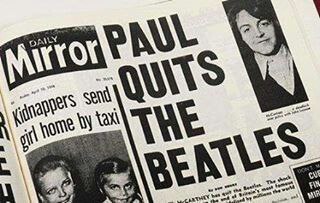
This sad day was April 10, 1970, when the auto interview was published Paul McCartney, timed to coincide with the imminent release of his McCartney solo album. The release did not directly mention the breakup, but it became obvious to fans.

This document is signed John Lennon, Richard Starkey (aka Ringo) and George Harrison, were sold at auction for 325 thousand dollars.
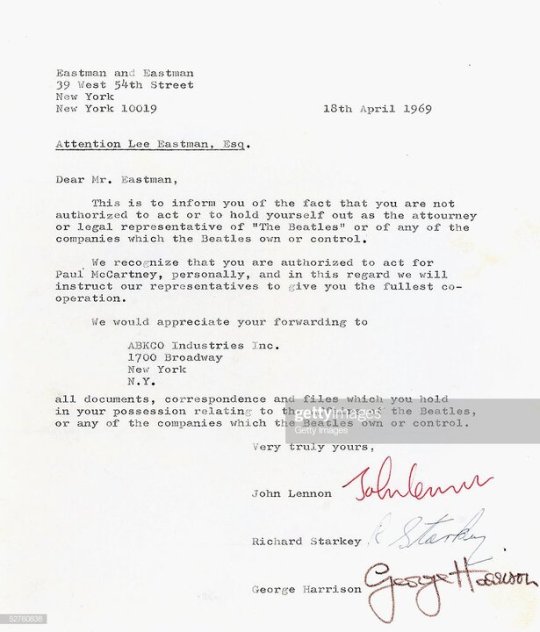
April 18, 1969
Dear Mr. Eastman,
We hereby inform you that you are not authorized to act or present yourself as a trustee or legal representative of The Beatles or any of the companies that The Beatles own or control.
We recognize that you are authorized to act on behalf of Paul McCartney personally, and in this regard, we will instruct our representatives to provide you with the fullest cooperation.
We will be grateful to you for forwarding to the address:
ABKCO Industries Inc.
1700 Broadway
New York
NY
of all documents, correspondence and files in your possession relating to the affairs of the Beatles or any of the companies that the Beatles own or control.
With respect,
John Lennon
Richard Starkey
George Harrison
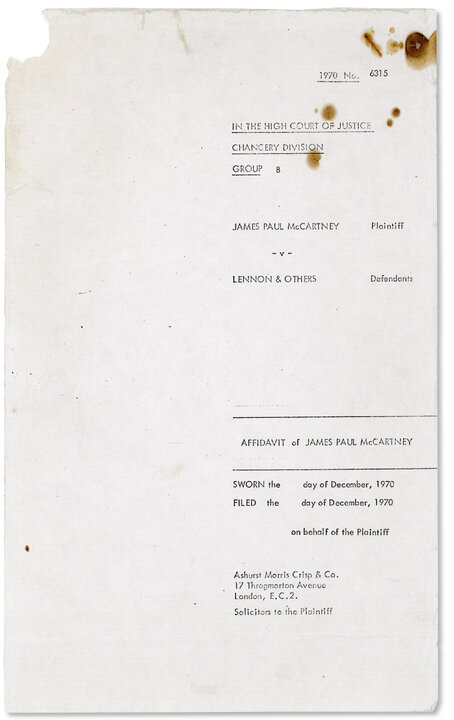
The beginning of the end: a lawsuit Paul McCartney in 1970, initiating the trial of the dissolution of the Beatles, with handwritten comments John Lennon, refuting the accusations McCartney. A historic and noteworthy document that marks the official action to end the partnership that has dominated pop music since 1964. On New Year's Eve 1970 McCartney took a fateful step after years of infighting and creative differences, many of which are outlined in the 25-point list of the lawsuit.
One of the key reasons given is Paul, is the band's decision to stop touring:
“While we were touring, the relationship between us was very close.”
As for their studio showdown, McCartney claims that:
“Lennon was no longer interested in performing those songs that he had not composed himself.”
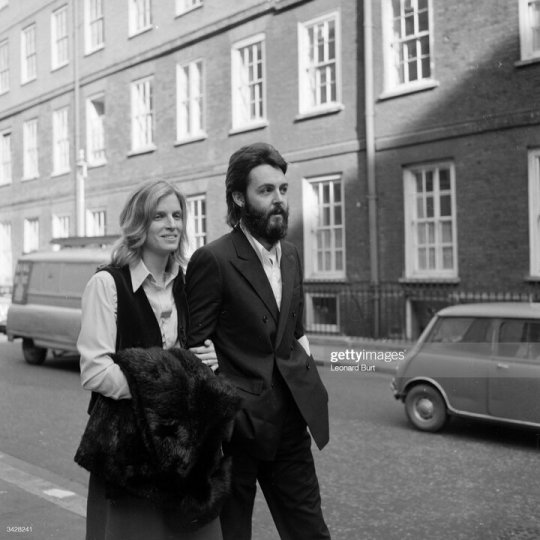
Paul and Linda outside the courthouse, 1971
He also claimed that being a member of the Beatles posed a threat to his creative freedom. Finally, he stated that no reports had ever been provided to the partnership since its inception.
Lennon objects to this:
“There are a lot of quarrels about leadership on the tour”
As long as The Beatles became more and more a studio band, and they began to creatively distance themselves from each other.
“The musical differences became more pronounced,”
and by the time the band recorded Abbey Road, Lennon was no longer interested
“in performing songs that he had not composed himself.” Lennon responds: “
Paul has been responsible for this for many years.”
youtube
When, according to McCartney, Lennon finally expressed a wish “get divorced,” he explained, as he claims Paul said that “in fact” the band had come full circle because the photo of the band that would be used on Get Back [became the Let It Be album. - Approx.perev.], so similar to their first album.
“It never happened,” Lennon exclaimed.
One of the last drops for Paul was the question of the release date of his McCartney solo album. Apple tried to delay the release, and McCartney saw this action as a threat to his creative freedom. To this accusation Lennon replied that the band was “outraged by how unceremoniously his record ‘suddenly’ appeared, and demanded a release date without taking into account other Apple releases.”
Paul also disliked Phil Spector's work on Let it Be, and claimed that he was not consulted - which “never happened before.” Lennon countered that it “happened in the early days.”

No group meetings were held between April and August. In April McCartney wrote To Lennon, “suggesting that we ‘let each other out of the trap’.”
According to Gender, John responded by attaching a photo of himself and Yoko Ono with the inscription on a balloon: “How and why?” McCartney replied:
“How: by signing a document stating that we are thereby terminating our partnership. Why: because there is no partnership.”
According to Paul, Lennon sent a reply postcard saying that if McCartney will be able to get the consent of the others, he will think about it. In the margins opposite these words Lennon quipped: “I expect something a little less ‘poetic’, given that his advisers have been explaining it to him for 2 years.” Then McCartney accused Lennon entered into agreements concerning their joint publishing venture without his consent, to which Lennon objected: “no one can even contact him,” meaning McCartney.
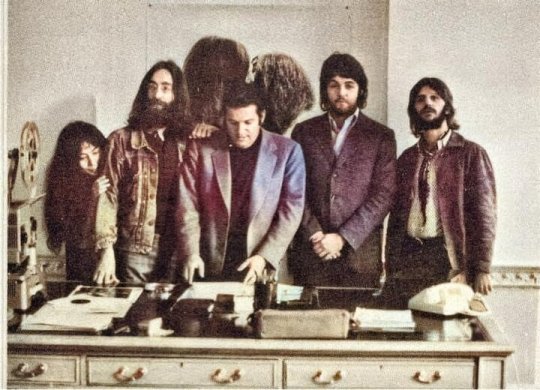
P.S. There is no need to regret what happened, and even more so, many years ago. Without those events, there would have been no individual creativity of all participants and their individual talents might not have been revealed.
The Beatles were inducted into the Rock and Roll Hall of Fame (1988)
#the beatles#Yoko Ono#John Lennon#Allen Klein#Paul McCartney#Ringo Starr#1969#music story#music store#music#music love#musica#history music#my spotify#my music#Youtube#Spotify
28 notes
·
View notes
Note
Mid-1969, Allan Klein and the Beatles are having a private meeting with Allan still trying to convince them to have him be their manager. He gets really frustrated and lashes out at one or all of them, and in an act of self defense Paul, Ringo, George, and John end up accidentally killing him. Afraid of what might happen if anyone finds out, they all agree to cover up their involvement in the crime. Their personal lives/marriages start to crumble as they’re forced to rely on each other as the only people they trust. Would like the inclusion of mclennon and George X Ringo
.
#prompts#au#1969#allen klein#all beatles#mclennon#john#paul#george#ringo#john and paul#mcstarr#george and ringo
21 notes
·
View notes
Note
of all the great unsolved mysteries in beatledom, high up near the top of my list is wtf allen klein thought his strategy was when dealing with paul. all these biographers telling me he was cunning and good at reading and manipulating people but his whole approach to paul was just......be mean enough to him and eventually he'll cave? i've never heard a satisfying explanation for how and why he got it so wrong with paul at what seems like a pretty basic level, but it's tragically fascinating.
You know, I was reading John's 1971 St. Regis interview recently, and in it, he actually says that Klein (being the Rolling Stones' manager) asked Mick and Keith about what the Beatles were like and what their internal dynamics were. So I feel like that adds another angle to the whole thing - did they tell Klein that Paul was a pushover? Did they actually think that was true at the time? Was someone being trolled here?
Otherwise, all I can think is that he stereotyped them based on how they looked and concluded that John was the alpha male and Paul was the pretty boy who'd go along with whatever John decided. Which makes it kind of satisfying to think of it all blowing up in his face. He does seem to have tried winning Paul back later, but not until it was much too late.
52 notes
·
View notes
Note
I just listened to a series of episodes on Allen Klein on another podcast I generally enjoy and was surprised by how I felt they didn't give enough attention or weight to Klein's hostile and aggressive treatment of Paul. I find super detailed discussions of specific events, missteps, and actions by both "camps" in this period almost superfluous compared to the foundational truth that Klein's approach to and treatment of Paul was totally inappropriate for someone who wanted to *be his employee and represent his interests,* which required a strong element of trust. That would be true in any situation with any person, but bullying and intimidation were also the absolute worst approach to take with Paul, in particular. This is a trend I notice in discussions of this period in general. For all his alleged ability to read people, Klein pegged Paul totally wrong from the start. Even if all of the other business stuff didn't happen, it still seems to me that Paul would have found it fundamentally untenable to be treated like this by Klein (and his bandmates and closest friends), especially at this stage in his life and career. Klein may have realized that but certainly underestimated it and assumed Paul would be unhappy but cowed by the other three (mostly John) and the payoff of Klein's presumed financial success for the band. He never seems to have seriously attempted to course correct or change his approach, even right up through Paul's lawsuit. I don't think he imagined in a million years Paul would reach his breaking point and leave the band, but I find it hard to see any other eventual outcome (though it may have taken longer to happen if events had played out differently). There seems to be this obsession now with identifying specific business events during this time and assigning weight and blame, alongside a bizarre new trend to reassess or rehabilitate Klein's image by concluding "actually, Klein wasn't a bad manager for the Beatles because he got them more royalties!" I've found that most of these conversations ignore or minimize what seems to me the obvious truth that Klein's approach was doomed to failure from the start because he just did not understand Paul at the most basic level. Approaching the conversation like this also seems to weirdly ignore the fact that Paul was an actual member of the band and Klein was not -- Paul and Klein's behavior and actions toward each other are often assessed in the same way, as if Klein were a Beatle himself. Sorry for this monster of a message, but I apparently have a lot of feelings about this!
We got you, fam!
We spend 30 minutes on Klein in our latest episode (answering an ask similar to yours!). Listen HERE
Suffice to say: We agree with you on all points and then some! Thank you for taking the time it write in and thank you for listening to AKOM ❤️
My full rebuttal is in the ep, but here's the excerpt from The McCartney Legacy I read:
In London, Justice Stamp handed down his decision on March 12, 1971, and it vindicated virtually every clause of McCartney's complaint. Listening to his brother-in-law's summary of the verdict over the phone, McCartney felt the jubilation that comes from having an uninvolved third party listen to your argument and agree entirely-a striking contrast to the fruitless debates in which he engaged with John and George all through 1969.
Justice Stamp found that the appointment of Klein and ABKCO to run Apple without McCartney's agreement was "a breach in the terms of the partnership deed.” Moreover, he noted that in several cases, Klein had taken fees greater than those to which he was entitled -or as he put it when addressing Klein's commission on EMI earnings, "ABKCO has made grossly excessive claims for commission and has received commission grossly in excess of that specified" in the agreement engaging Klein to manage Apple.
He found that decisions were made that Paul was not, but should have been, consulted about, and he gave the back of his hand to the other Beatles' argument that Paul sometimes could not be found, noting that if they could not reach him directly, they could have gone through his legal adviser, John Eastman. In one especially egregious case, he found that the Beatles and Apple had "acted in bad faith" by making a "covert oral agreement increasing ABKCO's commission" without McCartney's knowledge and consent--a "grave breach of duties" as McCartney's partners.
He also called out Klein's dishonesty in two sections of his affidavit and expressed irritation with Finer, who knew that those sections were inaccurate, but when challenged by Hirst, described them as "silly" and a mistake- something that, Justice Stamp argued, was a waste of the court's time. Klein's statements, he added, "read to me like the irresponsible patter of a second-rate salesman." Nor was he much impressed by Klein's explanation that his recent tax conviction was just a misunderstanding.
The bottom line was, Justice Stamp agreed that both business and personal considerations militated toward the dissolution of the partnership.
"Each of the Beatles has made and is making recordings otherwise than as the group of four referred to in the partnership deed. There is an issue whether the product of these separate recordings is or is not partnership property."
If so, he continued, this would cause "the odd situation" in which the four Beatles, "exercising their art separately, with inevitably varying degrees of skill and success" are contributing to the
partnership in different proportions, all under the management of Klein, who McCartney mistrusts. if, on the other hand, the income from solo work was not "partnership property” as McCartney argued, the Beatles would be competing against one another, and possibly against Beatles recordings. Either way, the judge wrote, the best solution was to bring the partnership to an end.
"The squabblings which are described in detail in the affidavit evidence may in truth be attributable primarily to the management situation but also to the situation in which the Beatles find themselves in the respects which I just mentioned. Confidence is gone; and although the discontinuance of joint recordings- and I am satisfied on the evidence the possibility of their being resumed is negligible-is not in theory destructive of the partnership, it may be thought as a practical matter that it would be inequitable to do otherwise than dissolve it."
Justice Stamp added a final nail to the partnership's coffin by noting that the other Beatles and Klein had treated McCartney unfairly, and that this was unlikely to change.
"The circumstances regarding the appointment of ABKCO and subsequent surreptitious increase of its remuneration point clearly to the conclusion that the Defendants are prepared, in conjunction with or at the instance of Mr. Klein, to make the most important decisions without regard to the interests of the Plaintiff."
Having ordered the partnership dissolved, Justice Stamp turned to McCartney's demand for the appointment of a receiver. "The financial situation is confused, uncertain and confusing; he wrote. "A receiver is, in my judgment, needed not merely to secure the assets, but so that there may be a firm hand to manage the business fairly as between the partners and to produce order.
He appointed James Douglas Spooner, a London chartered accountant with a reputation as a "company doctor," as receiver and manager. But he agreed to allow a week for the Beatles and Apple to prepare and file an appeal. They did so on March 19, but on April 26, they dropped their appeal, opting instead to negotiate Paul's exit from the partnership agreement.
Airing their dirty laundry in public view had not done the normally PR-savvy mop tops any favors, but for McCartney it was a necessary first step to diminish Klein's control of Apple and, Paul hoped, turn John, George, and Ringo on to Klein's nefarious ways.
"I was doing something for them (the other Beatles], McCartney explained. *I had to go after him [Klein], it was obvious I had to go after him, but I had to go after him in this incredibly crazed way. You know, after all that love and peace I had to turn 'round and sue my brothers. But no one could find any other way for me to make a stand against Klein, so I had to do that.... And obviously they hated me for a period after it because all they could see was me just trying to screw them?
28 notes
·
View notes
Note
"Does John sincerely think he’s helping everyone by getting Klein? Or is it more selfish? "
I don't think this is necessarily an either/or. He alludes himself in the lunchroom tapes to trying to stop his manipulative behaviour before catching himself "at it again". And honestly, with how Get Back shows how much they needed a manager, I think it would have been easy to convince himself it was necessary for the band, even if it needed some manoeuvring around Paul to do.
And honestly, I see a similar line in Paul's actions around that time that read as selfish to the other members - I think he justified it to himself as for the good of the band and the truth was likely somewhere in between, though I think Paul generally lacked the self awareness to be able to catch himself acting more for his own self interest.
Also as an aside on the Klein thing, I can't remember the source but I read something about how he practically bragged of using certain similarities in his parental background and upbringing with John - I think he have may also been brought up by an aunt? - to gain his trust and it made John's enthusiasm for how well Klein understood him more understandable and sadder to me - but yes, he's oddly manipulable in general for someone generally so emotionally perceptive. On those occasions, I think he really wants to believe.
*Insert Paul McCartney Voice* Oh, you’re so right. Everything in this ask was so correct. Thank you for sending in your wisdom.
John not only being aware of, but actively trying to prevent, his manipulative tendencies is a very important point. Maybe he likes that Klein will give him more power in the band, and yeah, maybe he realizes he’ll need to sneak behind Paul’s back to get Klein, but yeah. They did need a manager. So he is off course thinking of the band. And Paul himself has specifically said multiple times that he hates trying to “boss” or “manage” or “produce” the Beatles, so John is probably also thinking of Paul.
Oh, that aside, though. I think I did hear somewhere that Klein did have a similar familial background to John (Referenced in Steel and Glass). I didn’t know he’d bragged about using that similarity to gain John’s trust. The last sentence is just so painfully true. “On those occasions, I think he Wants to believe.” Yeah. That’s John. That poor man had his heart stomped on so many times and still chose to open himself up again and again. Paul has the reputation for stalwart optimism, but I think John might actually have him beat there.
#thanks for the ask!#It's so nice when I can ask a question in a post and get such a smart answer back#the beatles#paul mccartney#john lennon#allen klein
18 notes
·
View notes
Text
Call him “Epstein” – How far is Mark Lewisohn willing to go to force a false narrative?
“I don’t care what you think of Klein, call Klein something else. Call him ‘Epstein’ for now, and just consider the fact that three of us chose ‘Epstein.’”
John Lennon to Jann Wenner, Rolling Stone, May 14, 1970
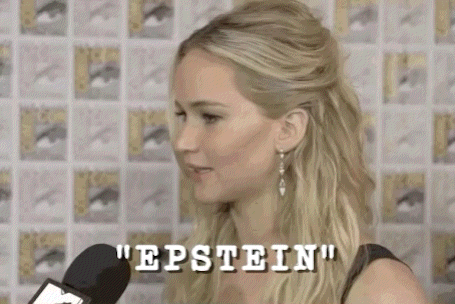
I keep asking “Why do you want me to believe John —(or George or Paul or or or)—said this?” And I keep asking because that is the question that keeps coming out of my mind, my mouth, and my keyboard.
It's the obvious question. (Spoiler: audio below of Lewisohn answering it for this quote.)
When you’re going to so much trouble to quote shop and quote twist, you have a purpose that you are torturing all these words to back up. You are trying to prove a point and there’s no real quote to support your position, so instead of changing your position, you act like Beatles’ words are appetizers in a buffet.
THREE OF US CHOSE EPSTEIN.
This premeditated and purposeful OBSCENITY has been sitting there for ten years. Two ladies with a podcast found it.
However, John remembered Paul’s attitude to Brian being very different. John was always emphatic that Paul didn’t want Brian as the Beatles’ manager and presented obstacles to destabilize him, to make his job difficult … like turning up late for meetings. “Three of us chose Epstein. Paul used to sulk and God knows what … [Paul] wasn’t that keen [on Brian]—he’s more conservative, the way he approaches things. He even says that: it’s nothing he denies.”(72)
I will never—NEVER— get over this one. There may be more shocking things to come, but it was this revelation that made me look at every one of Mark Lewisohn’s “author interviews” differently.
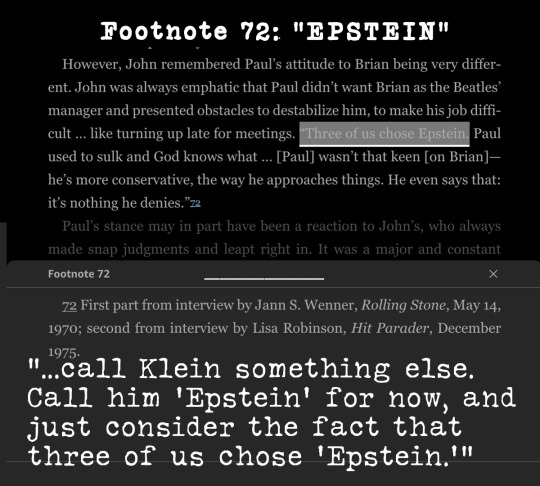
This is when I realized that there is nothing I would put past him.
Listening to that part of Episode 7 is so funny to me now. Daphne and Phoebe kept trying to stick to the outline and ask “Does this quote back up Lewisohn’s thesis?” but it was very difficult because they were in such total disbelief at Mark Lewisohn’s deception. (My label, although it’s a pretty inarguable one.) It is genuinely almost unbelievably dishonest. AKOM had a whole show filled with whoppers to get through, and they kept trying, but it took them awhile to move on because air-quotes-Epstein was like a magnet that kept pulling them back. So yesterday, to get out of editing some of my own mess, I put together a few of the times that the shock sucked them back in.
“I find that kind of shocking, really.” Tiny compilation of Phoebe and Daphne in disbelief over Mark Lewisohn’s purposeful misrepresentation of a quote of John Lennon talking about Allen Klein to attempt to show that John thought Paul was trying to thwart Brian Epstein. (Episode 7)
And most of us strongly suspect where Mark Lewisohn is going with this. He wants to rehabilitate Allen Klein because John can literally never be wrong—or perhaps an even stronger motive—he wants Paul to be very, very wrong. But whatever his motives, we can see what he’s doing. And we don’t have to just suspect, because he has already told us that he is going to use some of his most unforgivable lies to shape that narrative.
And there’s only one reason to do that: because there are no real quotes to back up the narrative he wants to push.
It tells us, in no uncertain terms, that the narrative he wants to push is quite literally unsupportable.
To make it work, Lewisohn has to lie about what John Lennon actually said.
*This post was first going to be about both the “quotes” that Mark Lewisohn references here, but in the end I couldn’t not give “call him ‘Epstein'” its own post. Which means I have actually shortened a post. (Please clap.)
Every ‘quote’ in the “spanner in the works” section is bullshit. Every. Single. One. I’m not going to the thesaurus for a fancier word. They are bullshit. Complete and utter, doctored, twisted, bullshit. The man is lying. And what really chaps my ass is that he is flat out telling us that he is going to use those same lies to push his bullshit narrative of the breakup. Like damn, that takes a lot of nerve.
Here is Mark Lewisohn telling us, straight out, that it’s these same bullshit quotes that he plans on using again to fool us. And he should be a laughingstock when he does. Not in some quarters. In all.
He must think we are such dupes. Although he’s gotten away with it so far, so up until now he hasn’t been wrong.
(There’s a bit more to this part of the Q & A and it’s all bad, but for this post I decided to leave it at Mark Lewisohn telling us that he is going to use the exact same sources he used for the “spanner” section to push this lie in the upcoming books.)
Fool me twice…
Would John and George have seen the parallel between Epstein and Klein in 1969? LEWISOHN: ❝Yes. I’m sure the answer to that is yes, because John mentioned it in interviews, probably in Wenner’s, maybe the one with McCabe and Sconfeld— Schonfeld. Yes.❞ (📍Nothing is Real)
Transcript:
Q. In Hornsey Road you were talking about the three-to-one Allen Klein split, and I was saying to you that it seemed to me that it paralleled what is mentioned in Tune In about, uh, the appointment of Brian Epstein. That- that Paul was sort of holding back or was not keen to move forward with Brian Epstein. And I suppose my question was, is there a direct parallel there? And would, in 1969, John and George in particular have been conscious of that parallel?
LEWISOHN: Yes. I’m sure the answer to that is yes, because John mentioned it in interviews, probably in Wenner’s, maybe the one with McCabe and Sconfeld– Schonfeld. Yes. John recognized that.
Nothing is Real Podcast • October 16, 2019, Episode 15 • Mark Lewisohn, Part II
---
And just remember that this is only one half of a hellacious Frankenquote.
(But I kept it short. 🎊 )
----
Even though I have given you zero reason to go there, it's also on my blog.
#the beatles#mark lewisohn#akom#fine tuning#tune in#beatles#historiography#brian epstein#allen klein#john lennon#paul mccartney#air-quotes-epstein#footnote 72#spanner in the works#lewisohn#call him “epstein”#Spotify
51 notes
·
View notes
Text
Paul’s letter to Allen Klein
❝ Incensed by the delays, Paul waited until the problems were sorted and the album [Wild Life] was released, and then he reminded Klein who had won the lawsuit. On a piece of Kidney Punch Music stationery, bearing MPL’s London and New York addresses and the publishing company’s logo—a martini glass with a boxing glove in it—he dashed off a quick note, by hand, that read:
Dear Pig,
You have nothing to do with my affairs, so keep out of them!
Fuck off.
P.M. ❞
— The McCartney Legacy, Volume 1: 1969 – 1973 by Allan Kozinn and Adrian Sinclair (2022)
328 notes
·
View notes
Text
Allen Klein: you promise you didn't get me bees again?
Paul, standing 10 feet away: just open it.
30 notes
·
View notes
Text
PLAYBOY INTERVIEW: ALLEN KLEIN
a candid conversation with the embattled managed of the beatles
Published in the November 1971 issue of Playboy Magazine
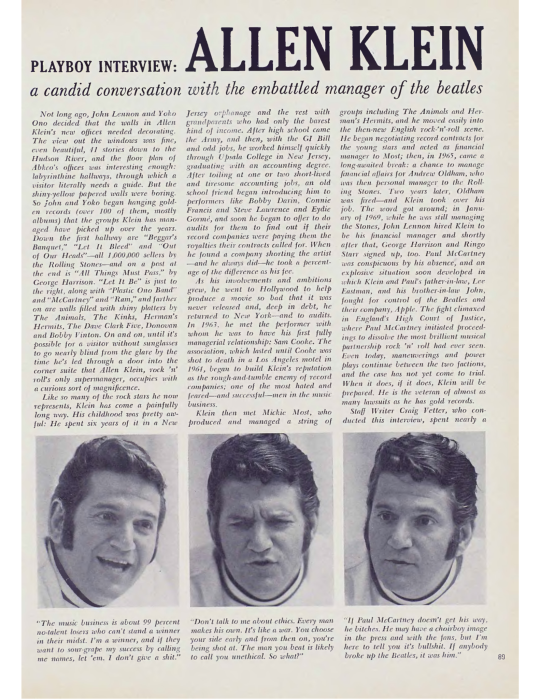
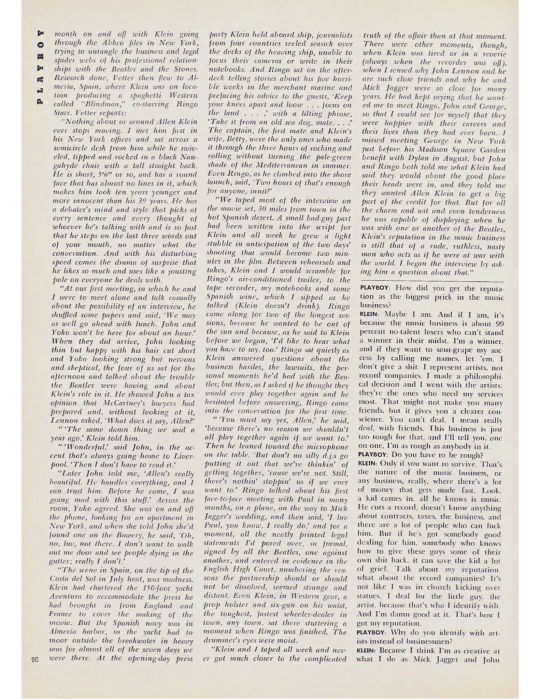
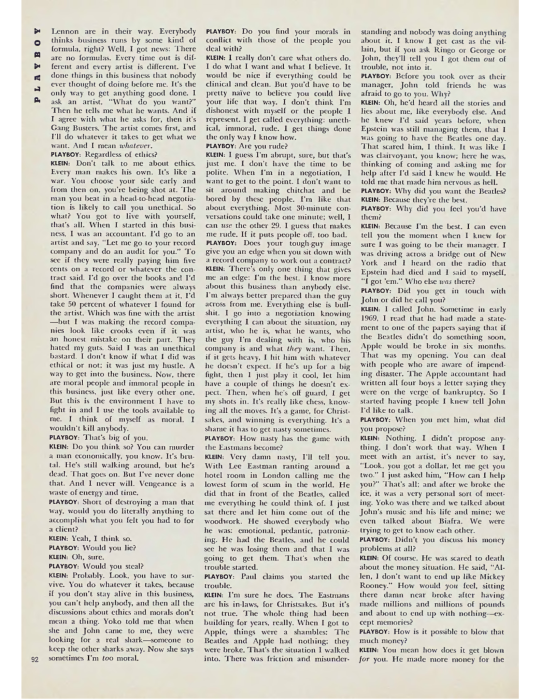
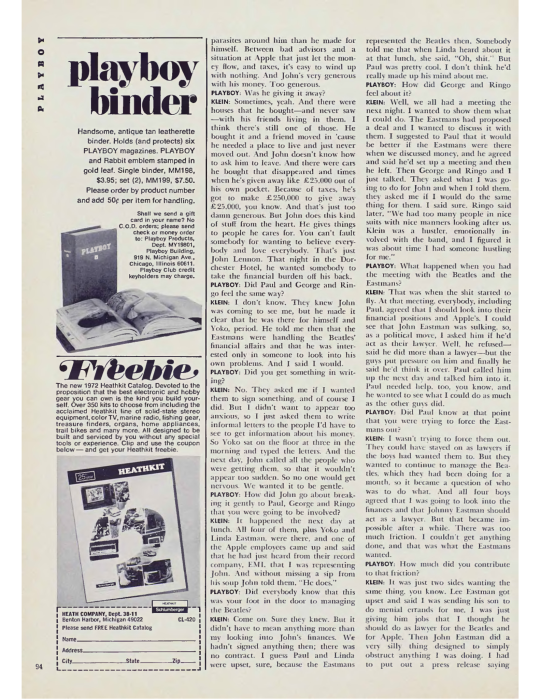
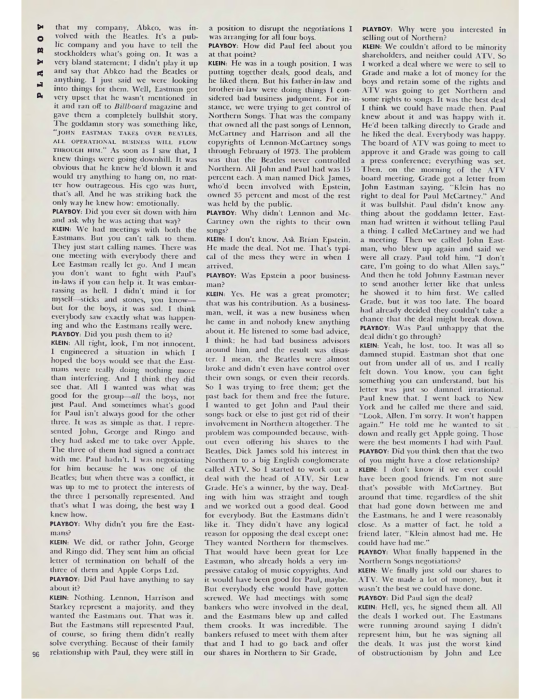
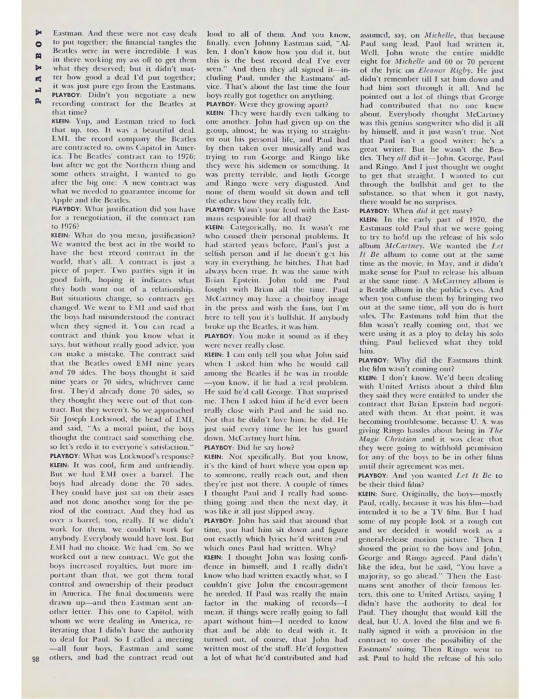
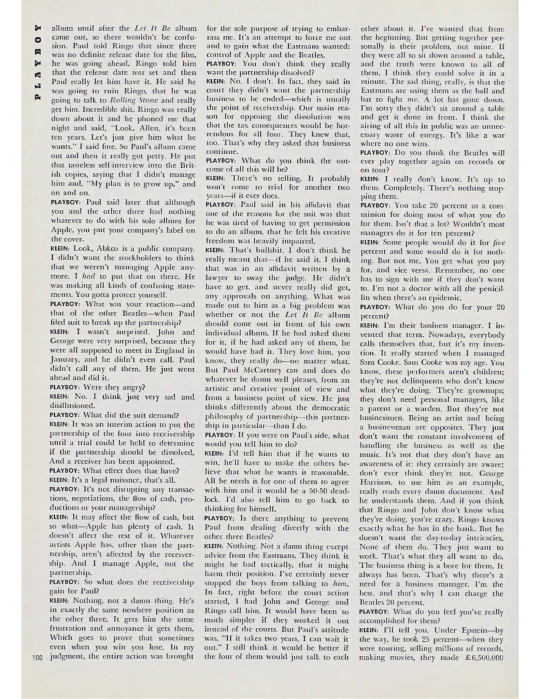
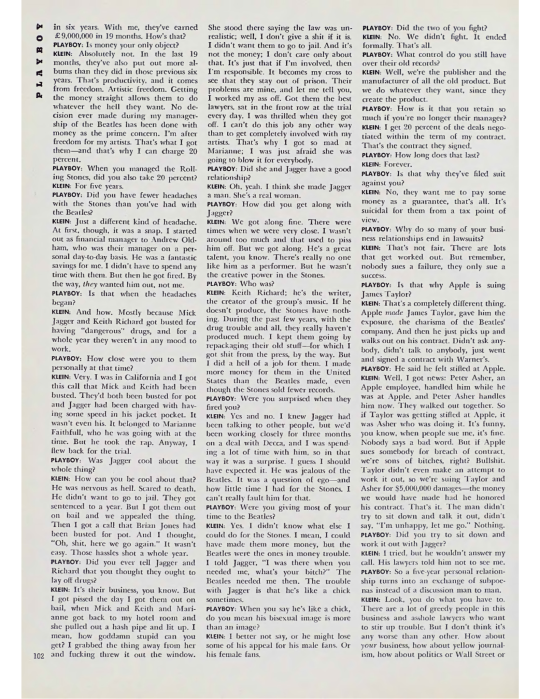
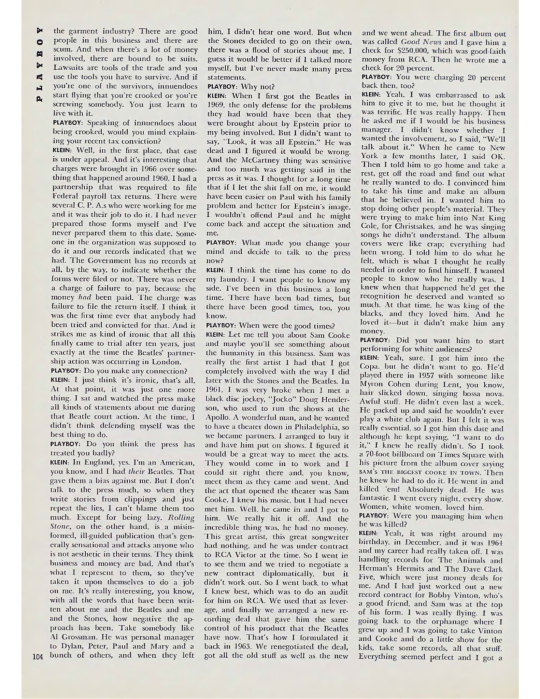
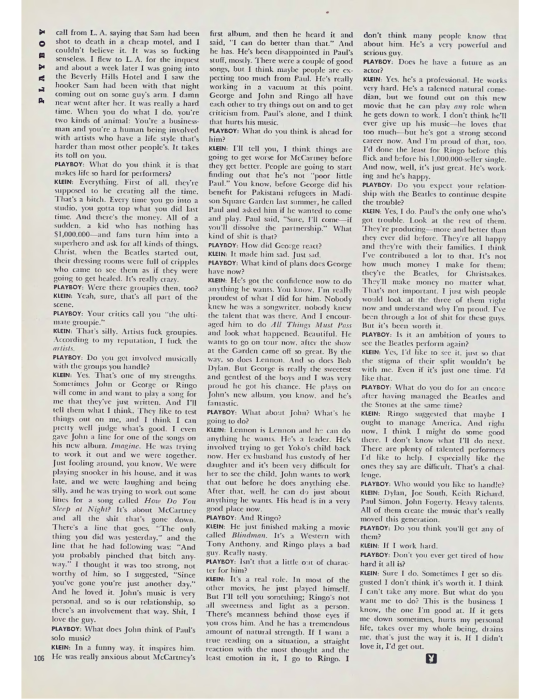
#my articles#my quotes#enjoy?#for some reason this is difficult to find online#though not THAT difficult given that I found it in like 20 mins by looking for Playboy archives rather than this interview specifically#I now have access to every Playboy ever#in case you wanted#I’ll go through looking for Beatles stuff#but I have always wanted this full thing#so here ‘tis#he talks like Trump#so I found it a little insufferable#allen klein#the beatles#beatles#john lennon#paul mccartney#george harrison#ringo starr
31 notes
·
View notes
Text
Hi. I don't know if I'd call this a 'hot take' or anything, but I really don't like how, in talking about how people like Klein, Spector, Magic Alex, etc. managed to get the Beatles on their side, people sound kind of victim blamey towards them, like they should've known better. Like, 1. They didn't have the knowledge and hindsight we know now, 2. People like that are very good at hiding who they really are to draw their victims in, and 3. What's obvious to us may not be obvious to everyone else. Whenever I see posts like that I ask myself, "Are the boys really that naive, or are these people just really good at pulling a facade to draw them in?"
#submission#good thoughts#i think a lot of the time the people who do this do not think deeply enough about why otherwise reasonable (or not) people fall for con men#fab four#allen klein
7 notes
·
View notes